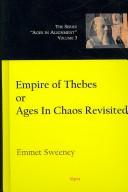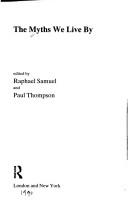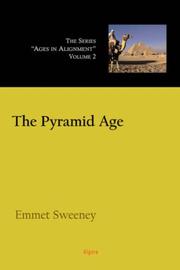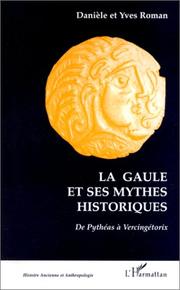| Listing 1 - 10 of 15 | << page >> |
Sort by
|

ISBN: 128139811X 0875864813 9780875864815 9780875864792 0875864791 9780875864808 0875864805 Year: 2007 Publisher: New York : Algora Publishing,
Abstract | Keywords | Export | Availability | Bookmark
 Loading...
Loading...Choose an application
- Reference Manager
- EndNote
- RefWorks (Direct export to RefWorks)
Empire of Thebes
Egypt -- History -- Errors, inventions, etc. --- Egypt -- History -- New Kingdom, ca. 1550-ca. 1070 B.C. --- Middle East -- History -- Errors, inventions, etc. --- Middle East -- History -- To 622. --- Velikovsky, Immanuel, 1895-1979. Ages in chaos. --- History & Archaeology --- Regions & Countries - Africa
Book
ISSN: 00833673 ISBN: 9782021034820 2021034828 Year: 2016 Publisher: Paris: Seuil,
Abstract | Keywords | Export | Availability | Bookmark
 Loading...
Loading...Choose an application
- Reference Manager
- EndNote
- RefWorks (Direct export to RefWorks)
Et si l’histoire, ou la vie, avait suivi un autre cours ? Ce que l’on appelle le raisonnement contrefactuel surgit spontanément dans les conversations pour nourrir des hypothèses sur les potentialités du passé et les futurs non advenus. Il traverse la littérature, les réflexions politiques et toutes sortes de divertissements. Que serait-il advenu si le nez de Cléopâtre avait été plus court ? Si Napoléon avait remporté la bataille de Waterloo ? Quentin Deluermoz et Pierre Singaravélou prennent la question à bras le corps. Ils mènent l’enquête au sein d’une vaste littérature pour saisir la diversité des usages de l’analyse contrefactuelle – des fictions uchroniques les plus loufoques aux hypothèses les plus sérieuses. Ils s’attachent à cerner précisément les conditions d’un usage légitime et pertinent pour les sciences sociales, repensant les enjeux de la causalité et de la vérité, des rapports entre histoire et fiction, entre déterminisme et contingence. L’enquête dévoile peu à peu la richesse d’un travail sur les possibles du passé, et ouvre sur des expérimentations dans le domaine de la recherche comme de l’enseignement. Une réflexion ambitieuse et novatrice sur l’écriture de l’histoire, sa définition et sa mise en partage.
Historiography --- Historiographie --- Imaginary histories --- History --- Philosophy --- Errors, inventions, etc. --- Contrefactuel (logique) --- Historiographie. --- History - Philosophy --- History - Errors, inventions, etc.

ISBN: 0415036097 9780415036092 Year: 1990 Publisher: London: Routledge,
Abstract | Keywords | Export | Availability | Bookmark
 Loading...
Loading...Choose an application
- Reference Manager
- EndNote
- RefWorks (Direct export to RefWorks)
History --- Oral history --- Errors, inventions, etc. --- Congresses. --- Errors, inventions, etc --- History - Errors, inventions, etc. - Congresses --- Oral history - Congresses

ISBN: 1281398233 0875865682 9780875865683 0875865666 9780875865669 0875865674 9780875865676 9780875865669 9780875865676 9781281398239 Year: 2007 Publisher: New York : Algora Publishing,
Abstract | Keywords | Export | Availability | Bookmark
 Loading...
Loading...Choose an application
- Reference Manager
- EndNote
- RefWorks (Direct export to RefWorks)
Ages in Alignment

ISBN: 0415034906 Year: 1990 Volume: vol *6 Publisher: London New York Routledge
Abstract | Keywords | Export | Availability | Bookmark
 Loading...
Loading...Choose an application
- Reference Manager
- EndNote
- RefWorks (Direct export to RefWorks)
History as a science --- Sociology of culture --- History --- Errors, inventions, etc. --- Congresses --- Oral history --- History - Errors, inventions, etc. - Congresses. --- Oral history - Congresses.

ISBN: 2738475671 9782738475671 Year: 1999 Volume: *4 Publisher: Paris: L'Harmattan,
Abstract | Keywords | Export | Availability | Bookmark
 Loading...
Loading...Choose an application
- Reference Manager
- EndNote
- RefWorks (Direct export to RefWorks)
Gaul --- Gaule --- History --- Histoire --- Historians --- Attitudes --- Marseille (France) --- Errors, inventions, etc --- Foreign influences --- Attitudes. --- Rome --- Errors, inventions, etc. --- Historiography. --- Foreign influences. --- Historians - Rome - Attitudes --- Gaul - History - Errors, inventions, etc --- Marseille (France) - History - Foreign influences
Book
ISBN: 2878960467 9782878960464 Year: 1992 Publisher: Levallois-Perret: Manya,
Abstract | Keywords | Export | Availability | Bookmark
 Loading...
Loading...Choose an application
- Reference Manager
- EndNote
- RefWorks (Direct export to RefWorks)
Conversation [Imaginal ] --- Conversation [Imaginary ] --- Conversations [Imaginal ] --- Conversations [Imaginary ] --- Conversations imaginaires --- Dialogues [Imaginal ] --- Dialogues imaginaires --- Fictieve gesprekken --- Imaginal conversation --- Imaginal conversations --- Imaginal dialogues --- Imaginary conversation --- Imaginary conversations --- Communism --- Communisme --- History --- Imaginary conversations. --- Errors, inventions, etc. --- -Imaginary conversations --- Conversation, Imaginal --- Conversation, Imaginary --- Dialogues, Imaginal --- Conversation --- Dialogues --- Annals --- Auxiliary sciences of history --- Errors, inventions, etc --- Stalin, Joseph --- -Miscellanea --- Miscellanea --- History - Errors, inventions, etc. --- Rapports Est-Ouest --- Prose politique --- STALINE (Joseph Vissarionovitch Djougachvili, dit) --- Union Soviétique
Book
ISBN: 9780299306007 9780299306038 0299306038 0299306003 0299306046 Year: 2016 Publisher: Madison, Wisconsin : The University of Wisconsin Press,
Abstract | Keywords | Export | Availability | Bookmark
 Loading...
Loading...Choose an application
- Reference Manager
- EndNote
- RefWorks (Direct export to RefWorks)
Emperors --- Allusions in literature. --- Biography --- History and criticism. --- Scriptores historiae Augustae. --- Rome --- History --- Errors, inventions, etc. --- Historiae Augustae scriptores --- Historia Augusta --- Storia augusta --- Istoria Augustă --- Augustan history --- Histoire Auguste --- Historiae Augustae --- HA --- Vlasteliny Rima --- Hisṭoryah Ogusṭah --- Rim --- Roman Empire --- Roman Republic (510-30 B.C.) --- Romi (Empire) --- Byzantine Empire --- Rome (Italy) --- History and criticism --- Sources --- Emperors - Rome - Biography - History and criticism --- Rome - History - Empire, 30 B.C.-284 A.D. - Sources --- Rome - History - Errors, inventions, etc.

ISBN: 0822932504 0822960818 0822973820 1322068623 9780822973829 9780822960812 9780822932505 Year: 1973 Publisher: Pittsburgh, Pennsylvania : University of Pittsburgh Press,
Abstract | Keywords | Export | Availability | Bookmark
 Loading...
Loading...Choose an application
- Reference Manager
- EndNote
- RefWorks (Direct export to RefWorks)
America in literature --- Amerika in de literatuur --- Amérique dans la littérature --- America --- History --- Errors, inventions, etc --- In literature --- 316.647.8 --- 094:970/980 --- Beeldvorming. Etikettering. Sociaal stigma. Stereotype vooroordeel --- Oude en merkwaardige drukken. Kostbare en zeldzame boeken. Preciosa en rariora-:-Geschiedenis van Noord-Amerika en Zuid-Amerika --- Americas --- New World --- Western Hemisphere --- -Errors, inventions, etc. --- In literature. --- 094:970/980 Oude en merkwaardige drukken. Kostbare en zeldzame boeken. Preciosa en rariora-:-Geschiedenis van Noord-Amerika en Zuid-Amerika --- 316.647.8 Beeldvorming. Etikettering. Sociaal stigma. Stereotype vooroordeel --- Errors, inventions, etc. --- America - History - Errors, inventions, etc --- America - In literature
Book
ISBN: 9781316606070 9781107151499 9781316584941 110715149X 1316606074 1316584941 1316839109 1316840085 Year: 2017 Publisher: New York (N.Y.): Cambridge university press,
Abstract | Keywords | Export | Availability | Bookmark
 Loading...
Loading...Choose an application
- Reference Manager
- EndNote
- RefWorks (Direct export to RefWorks)
"Understanding Collapse explores the collapse of ancient civilisations, such as the Roman Empire, the Maya, and Easter Island. In this lively survey, Guy D. Middleton critically examines our ideas about collapse--how we explain it and how we have constructed potentially misleading myths around collapses--showing how and why collapse of societies was a much more complex phenomenon than is often admitted. Rather than positing a single explanatory model of collapse--economic, social, or environmental--Middleton gives full consideration to the overlooked resilience in communities of ancient peoples and the choices that they made. He offers a fresh interpretation of collapse that will be accessible to both students and scholars. The book is an engaging, introductory-level survey of collapse in the archaeology/history literature, which will be ideal for use in courses on the collapse of civilizations, sustainability, and climate change. It includes up-to-date case studies of famous and less well-known examples of collapses, and is illustrated with 25 black and white illustrations, 3 line drawings, 16 tables and 18 maps"--
Civilization, Ancient. --- History, Ancient. --- Social change --- Complexity (Philosophy) --- Resilience (Personality trait) --- Human ecology --- History --- Social archaeology. --- Environmental archaeology. --- Civilisation ancienne --- Histoire ancienne --- Changement social --- Ecologie humaine --- Histoire --- Archéologie sociale --- Archéologie de l'environnement --- Social aspects --- Errors, inventions, etc. --- Erreurs, inventions, etc. --- Civilization, Ancient --- History, Ancient --- Social archaeology --- Environmental archaeology --- Social change - History - To 1500 --- Complexity (Philosophy) - Social aspects - History - To 1500 --- Resilience (Personality trait) - Social aspects - History - To 1500 --- Human ecology - History - To 1500 --- History - Errors, inventions, etc. --- Environmental archaeologye --- Errors, inventions, etc --- Història antiga --- Civilització antiga --- Complexitat (Filosofia) --- Història social --- Resiliència (Tret de la personalitat) --- Ecologia humana
| Listing 1 - 10 of 15 | << page >> |
Sort by
|

 Search
Search Feedback
Feedback About UniCat
About UniCat  Help
Help News
News